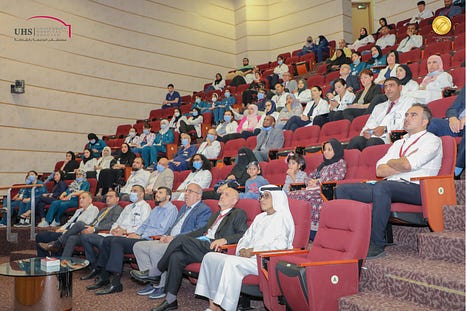University Hospital in Sharjah Launches Awareness Program on the Occasion of World Thalassemia Day
United Arab Emirates - Sharjah, May 2023:
Yesterday, University Hospital in Sharjah launched an awareness program on the occasion of World Thalassemia Day in collaboration with the International Thalassemia Federation, in a scientific seminar that included all specialties and started from 8:00 am to 10:00 am in the main auditorium at the hospital.

The program included scientific lectures for doctors, as well as free blood tests to the first 100 participants in the program.
Dr. Hakam Yasin, the Medical Director and Consultant Pediatrician and Neonatologist at University Hospital in Sharjah, stated that the hospital's medical staff deals with thalassemia on a daily basis, whether through early diagnosis or patient treatment. He emphasized that the seminar aims to raise awareness among patients and doctors about the disease, its prevention, and the latest treatment methods.
The UAE is one of the leading countries in raising awareness about the disease, preventing it, and keeping up with the latest treatment approaches. The country has also implemented measures related to premarital tests to detect genetically affected cases even without symptoms, with the carrier rate of the disease reaching 8.5% in the UAE.
Dr. Hakam Yasin added that the blood transfusion centers in the hospital, as well as in the UAE in general, are highly advanced and internationally certified. The transmission rate of diseases through blood transfusion has reached 0%. He further explained that over the course of 13 years, the hospital has expanded to include all specialties such as internal medicine, surgery, pediatrics, obstetrics and gynecology, interventional surgery, endoscopy, a distinguished unit for stroke care, and state of the art neonatal intensive care unit.
Similarly, Dr. Fadwa Saeed, a consultant in Hematology at University Hospital Sharjah, mentioned that the hospital organized this event in collaboration with the International Thalassemia Federation, especially considering that the UAE has a healthcare hub and has a large number of thalassemia gene carriers. The seminar aimed to reduce the chances of marriage between carriers in order to decrease the transmission rate of the disease at the national level and to prevent the birth of children with the disease through conducting tests and medical examinations.
She pointed out that the hospital provides comprehensive diagnosis for disease carriers, starting with blood tests, ensuring the absence of iron deficiency in individuals undergoing tests, and then conducting electrophoresis to determine the type of thalassemia, whether it is beta or alpha. She explained that avoiding thalassemia can be achieved through two types of prevention. The first is raising awareness among citizens that there are carriers of the disease, and when carriers marry, there is a 25% chance of having a child with the disease. The second type involves conducting tests that confirm the presence of the disease, starting with blood tests, in order to provide treatment for those already affected. The primary goal is prevention rather than treating new cases, as it is possible to prevent their occurrence.
###
Other articles and publications:
Articles and publications of other companies:
 Custom T-Shirts From Hub92prints Are The Fruits Of The Labor Of Its Skillful Team Of In-House Design
Custom T-Shirts From Hub92prints Are The Fruits Of The Labor Of Its Skillful Team Of In-House Design


